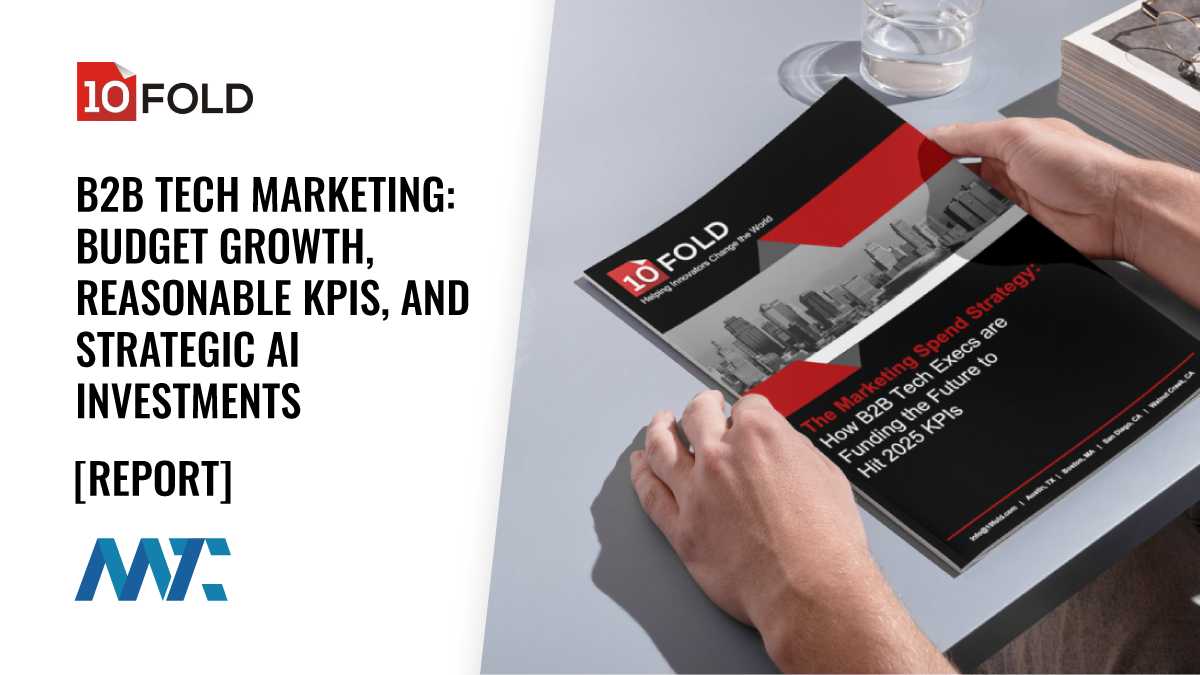B2B marketers in tech are navigating uncertain economic conditions with a mix of resourcefulness and strategic spending. According to the latest research:
Marketing budgets are being allocated and evaluated in new ways. In 2024, 65% of marketing executives reported budget increases. Surprisingly, 54% of those who received additional funding did not face stricter KPIs—a notable shift from previous years, where bigger budgets typically came with heightened demands.
The report by 10Fold, in partnership with Sapio Research, is based on a survey of 450 marketing executives across North America and Europe and offers insights into how B2B marketers adjust their priorities, invest in technology, and adapt strategies. These companies span various tech domains and represent firms with annual revenues from tech startups to multi-billion-dollar public tech companies. This report provides a look at the overall spending on programs, and a look at the region, number of employees, revenue, and tech domain, providing a comprehensive snapshot of the current marketing landscape in the tech sector.
Enhancing Efficiency with AI and Automation
One of the report’s most interesting findings is the role of AI and automation as critical drivers behind the recent budget increases. Among the executives who reported budget increases, a significant portion identified investments in AI tools and AI-driven campaigns over traditional programs as pivotal. Campaigns leveraging AI and automation performed better, which led to additional funding, creating a reinforcing cycle where success drives more investment.
Over half (53%) of marketers surveyed credited AI and automation investments with budget increases. Most notably, 71% of AI adopters reported receiving moderate to significant increases in funding.
For many B2B marketing leaders, AI is now a necessity, helping teams automate tasks, optimize outreach, and improve personalization.
The benefits of AI are particularly pronounced for companies focused on precision. AI-driven analytics enable teams to predict behavior, fine-tune segmentation, and dynamically adjust campaigns. With the success of programs and the resulting budget gains, it’s clear AI’s strategic value extends beyond just operational support; AI is now reshaping how marketing teams engage audiences and build campaigns.
Reducing Sales Friction with Smart Staffing and External Talent Resources
While budget increases were notable, B2B marketers have strategically expanded their teams, particularly with contractors and agencies. According to the report:
54% of respondents increased headcount this year, though 61% chose to allocate budget toward external talent. Smaller companies (with revenue under $10 million) showed an especially high reliance on agencies and contractors, with 48% reporting increased spending on external resources.
This approach reflects a commitment to skill diversity without the financial overhead of expanding permanent teams.
By combining in-house expertise with flexible external talent, marketing departments can quickly scale initiatives and adapt to new priorities. This enables marketing teams to tap external resources with specialized skills needed for high-impact projects without stretching internal teams thin.
Emphasizing High-Impact Channels for Lead Generation
When it comes to lead generation (leadgen), B2B marketers are investing in channels that consistently deliver results. The report highlights:
Marketing tools, websites, and digital advertising in national publications have been top choices in 2024, chosen by 33%, 30%, and 20% of marketers, respectively.
These established channels offer reliable pathways for brand building and lead generation, aligning with the current priority to optimize returns on every dollar spent.
Social media is also gaining ground as a B2B marketing asset, with X (formerly Twitter) and LinkedIn showing strong engagement metrics.
Nearly half of marketers (42%) focused on organic social media efforts, while 15% leveraged paid influencer partnerships to expand reach and credibility. X emerged as a favorite, with 57% of marketers favoring it over LinkedIn, showing a growing reliance on social channels for brand visibility and community building.
By blending organic and paid efforts, B2B marketers can create a multi-layered social media strategy that resonates with audiences across platforms.
Preparing for 2025
As marketing teams prepare for 2025, many are cautiously optimistic about continued growth. Many are shifting focus from short-term wins to more systemic improvements, prioritizing upgrades to foundational technologies and automation tools over quick-fix campaigns. With 77% of respondents expecting their company to grow next year, there’s a clear intention to build on the progress made in 2024. Budgets are increasingly being directed toward enhancing digital engagement and fully leveraging the potential of AI and automation.
This shift signals a move toward sustainable growth strategies, emphasizing efficient use of resources, impactful initiatives, and flexibility in execution. Despite ongoing challenges, B2B tech marketers are finding innovative ways to adapt, using targeted investments to make the most of their budgets and achieve meaningful results.
Marketing Spend Strategy Report



